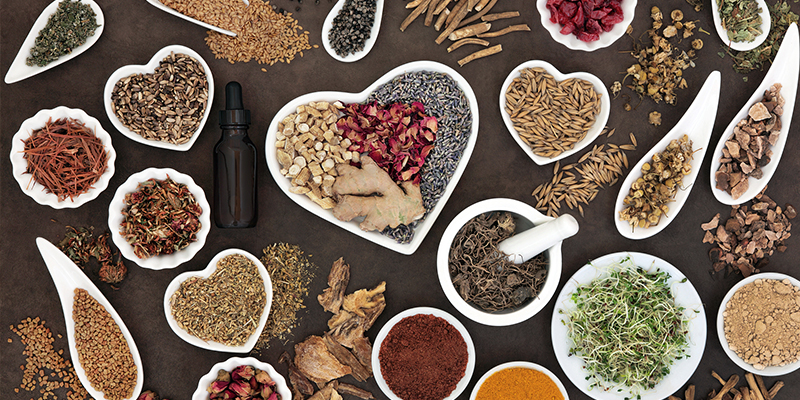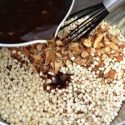Heart healthy foods
What better way to celebrate the month of love than by showing your heart some love? Heart disease is the number one killer in this country, and while genetics can definitely play a role, the vast majority of cases could potentially be prevented with a healthy lifestyle.
Here I’ve rounded up my top 10 foods for heart health that you might want to consider eating more of.
1. Beans
Beans, beans, they’re good for your heart. The more you eat them … the more you extend your quality years of life! Okay, I maybe changed that last part a little. But it’s the truth! Dry beans and peas, like lentils, chickpeas, and black beans to name a few, are high in soluble fiber and other heart-protective compounds, like flavonoids. Soluble fiber can help lower your LDL (the “bad” cholesterol) by binding to some of it and exiting your body with it. Flavonoids can help keep your blood platelets from sticking together, which can lower your risk of heart attacks and stroke.
2. Fatty Fish
Fish that live in cold waters, like salmon, tuna, mackerel, and sardines are great sources of heart-healthy Omega-3 fatty acids. These are polyunsaturated fats that have been linked with decreased triglycerides and blood pressure. They may also help prevent irregular heart rhythms. Aim for two servings per week (a serving is about the size of a deck of cards) to reap the benefits of these oils.
3. Nuts and seeds
All nuts and seeds are nutritional powerhouses and contribute to heart health with their fiber, healthy fats, and other phytonutrients. Some of the most notable are walnuts, flax seeds, chia seeds, and almonds. Nuts and seeds can lower your LDL, while raising your HDL (the “good” cholesterol); a heart-healthy double whammy! But because of all the healthy fats, these little guys are a little heavy on the calorie end, so consume them in smaller portions. Just a handful (about ¼ cup) of nuts a day is all you need. The serving size for seeds is even smaller – a tablespoon or two – so make sure to read the labels! Note: Your body cannot digest the hard outer shell of the flax seed, meaning you won’t get any benefit from them unless they are ground. Buy them whole and grind them yourself to ensure the highest nutrient content!
4. Berries
All berries are great sources of fiber, vitamins (like vitamin C – an anti-inflammatory), and minerals, as well as other health-promoting compounds, like polyphenols. Polyphenols may play a role in the prevention of degenerative diseases like cancers and heart disease. One observed effect of these nutrients is helping blood vessels to relax, which in turn lowers blood pressure. The benefits, though, depend on the amount consumed, so whether fresh, frozen (without added sugar), or dried, eat some for your heart every day!
5. Oatmeal and other whole grains
Studies show that people who eat plenty of whole grains, like oatmeal, barley, and quinoa, among others, have an easier time managing their weight and have a lower risk of heart disease than those who don’t. Whole grains have lots of fiber, phytonutrients, and antioxidants, which is probably what whole grains owe their heart protective properties to. Whole grains have been shown to be protective against coronary heart disease and high cholesterol (as well as several types of cancers, most notably colorectal cancer).
6. Apples
There are now many studies suggesting that people who eat apples are at a lower risk of strokes, and death from coronary heart disease and cardiovascular disease. This effect is thought to be due to certain antioxidant compounds found in apples that seem to play a role in preventing the buildup of plaque in the arteries. They are also a rich source of pectin, which is a type of soluble fiber known to help lower cholesterol. So maybe an apple a day really can keep the doctor away!
7. Dark chocolate
No, this doesn’t mean you can eat candy bars and drink hot chocolate every day! But dark chocolate has been found to be rich in flavanols, which have a blood-thinning effect and may also reduce inflammation. Milk chocolate does not seem to have the same benefits. Here’s the catch: Consuming too much added sugar of any kind is a risk factor for heart disease! So make sure to look for dark chocolate that is at least 70% cocoa to keep the benefit higher than the risk.
8. Grapes
Grapes, specifically red grapes, contain a compound called resveratrol, which is thought to help keep blood platelets from sticking together, thereby lowering your risk for adverse heart events, like strokes and heart attacks. The same compound is found in raisins and red wine, too, however alcohol carries its own heart health risks. If you don’t already consume alcohol, don’t start. And if you do, keep it to no more than one 5-oz glass a day for women, or two for men.
9. Broccoli (and other cruciferous vegetables)
Evidence is mounting that suggests cruciferous vegetables, like broccoli, cauliflower, Brussels sprouts, cabbage, and kale, can reduce inflammation in the body, and lower your risk of cardiovascular disease. The reason why is not yet well understood, but it may be due to the sulfur-containing compounds in these foods, that also seem to offer protection against cancer. Include these amazing veggies in your meals every week for a heart-healthy nutritional bonus!
10. Olive oil
Olive oil has been a cornerstone of the Mediterranean diet for centuries. It is one of the healthiest oils you can consume, and is widely available in just about every grocery store now. Olive oil is high in monounsaturated fats, which help decrease your LDL, while leaving your HDL intact. Olive oil is not to be used at high cooking temperatures however, as heating oil past its smoke point can cause the beneficial components to start to degrade, and potentially health-harming compounds to form. Olive oil’s smoke point is somewhere between 365° F and 420° F (the oil literally begins to smoke), so for higher heat cooking, choose canola or peanut oil.
While there are no magic foods when it comes to health, eating these foods as part of an overall healthy diet, in combination with other healthy lifestyle habits, can add up to more quality years of life for you to spend doing what you want to do. And that makes every heart happy!




